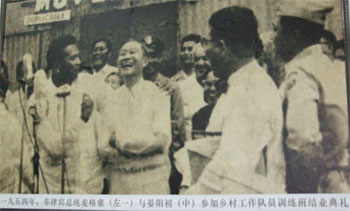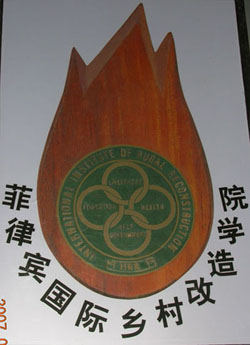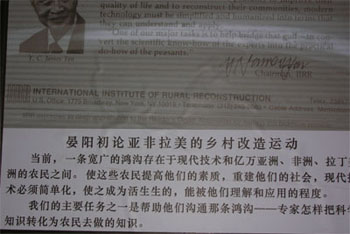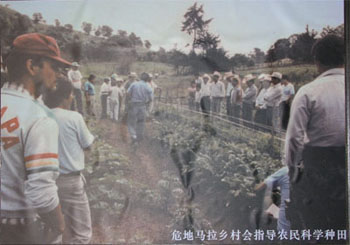 |
|
Yan always said that he was influenced by “3 Cs”, including Contucius, Christ and Coolies. He was selected as one of ten men who contributed greatly to modern world by more than one hundred American universities and institutions. In his lifetime, millions of the poor lives were changed. He was the first man to persuade American congress to offer provision to China. Until now, he was regarded as one of modern marks by Japanese.
Mr. Yan Yangchu (Y. C. James Yen) is an educator of mass education and social reformer well-known both in China and other foreign countries. His Mass Education Movement and cause of Rural Reconstruction are of great historic significance with glaring progressive thought even seen from an angle at the present time. Yan Yangchu was born in 1890 in Bazhong, a small town in northern Sichuan province. After Yan's father, a scholar, poet, and writer, accepted a job teaching Chinese to missionaries in the local China Inland Mission (C.I.M.) station, the missionaries urged him to send his son to a C.I.M. school. Graduating from middle school, Yan went to Hong Kong University, where he became friends with Fletcher Brockman, the national secretary of the Y.M.C.A. in China from 1898-1915. After studying from 1916 to 1918, Yan completed his bachelors degree at Yale.
|
 |
In 1917, Yan went to France to work with Chinese laborers who were working during World War I. After Yan became busy writing letters Home Page for the illiterate men each night, he asked for volunteers who would be willing to be taught 1000 basic Chinese characters. After the first group's success, he asked the colonel in charge of the Chinese labor corps to send the hundred Chinese Y.M.C.A. student volunteers to Boulogne for one week to observe his classes so they could also start classes. Yan vowed to devote the rest of his life offering not relief, but "release of the pent-up, God-given powers in the people." |
Dr. Yan was the only Asian ever to rank with such luminaries as Albert Einstein and John Dewey. In 1943 he won the Copernican Citation as one of the “ten greatest revolutionaries of our time.”
At the end of the second world war, Yan ever tried to ask Jiang Jie-shi to invest more into education, but it was refused. Then, Yan continued to persuade American congress and the president Mr. Truman. Finally, the "Jimmy Yen provision" was ten percent of the U.S. 1948 aid package to China. |

Philippine International Rural Construction College(still in use) |

Yan was delivered a speech on rural constriction in Asia, African and South America. |
In 1949, the Chinese Communist Party(CCP) finally succeeded in civil war. As Yan was Christian, he was not welcomed by CCP and he went to Taiwan. Since then, Yan and his popular education movement disappeared in Chinese mainland. He only stayed in Taiwan for a week, but Taiwan borrowed large amount of his experience in rural construction.
Yan lived the next thirty years in Silang, Cavite in the Phillipines encouraging rural reconstruction in the Philippines, Africa, Central America, and Southeast Asia. |
In 1956, Yan built the first international rural construction college in Phillipine. This institution was still working nowadays.
In 1988, when Yan was 98 years old, Mr. Reagan, delivered the message that Yan was one of the devoted people to others.
In 1989, when Yan was 99 years old, Mr. Bush said that Yan make others to realize children’s potential and value.
Yan believed that non-governmental institutions played an important role in the nation. Before American government was founded, many private institutions did a lot of creative work, which was a good way of innovation. |

Guatemala farmers were training how to make scientific farming. |
|
|
 |
|